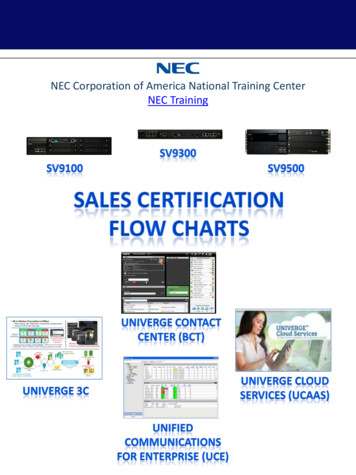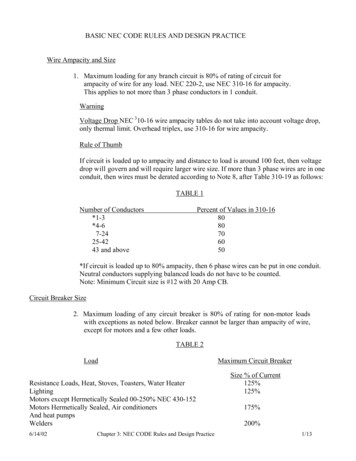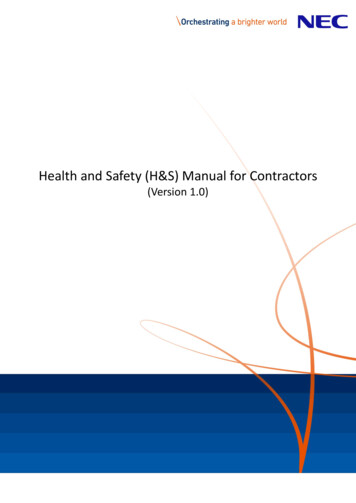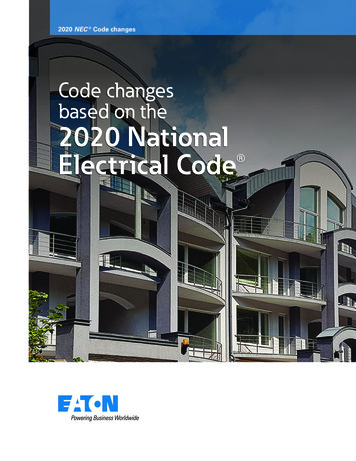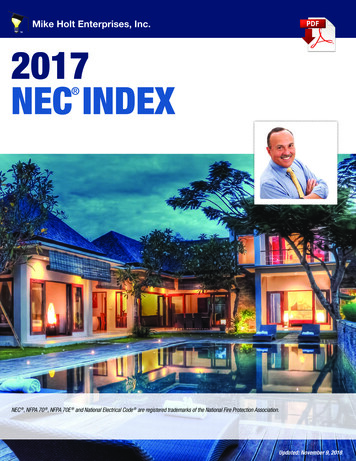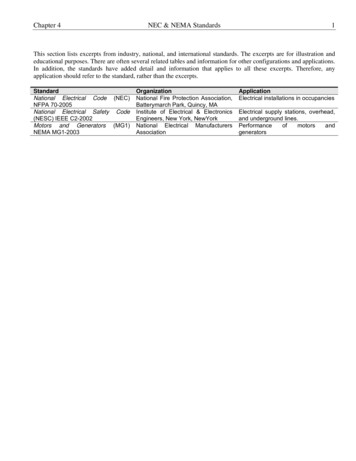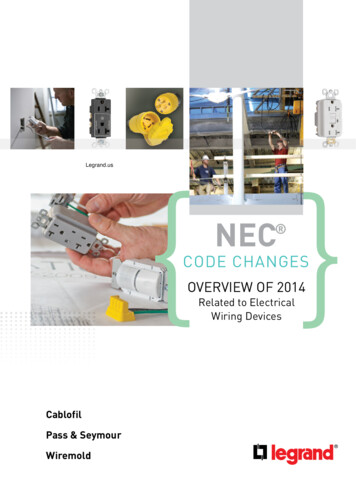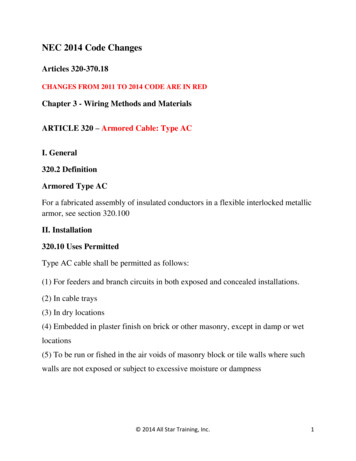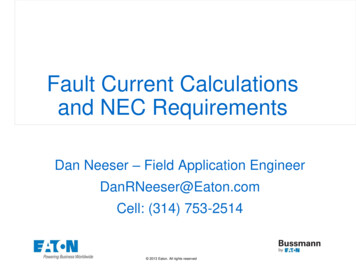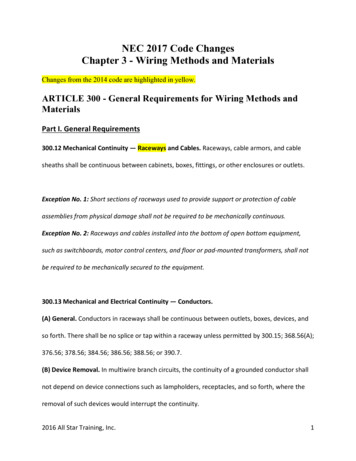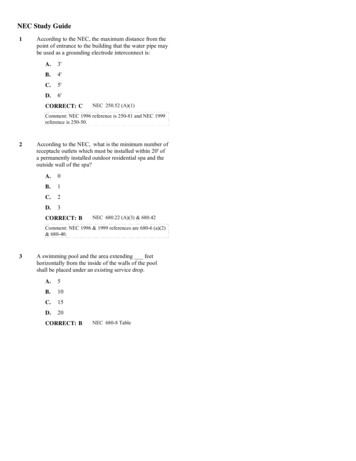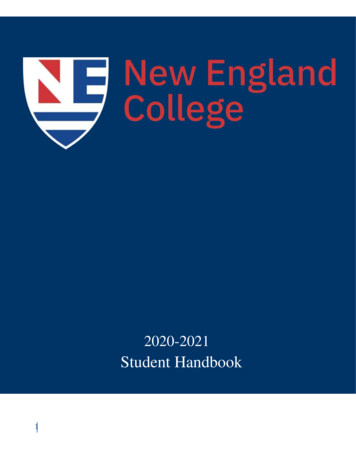
Transcription
2020-2021Student Handbook1
TABLE OF CONTENTSI.Letter from the Vice President of Academic AffairsII.Code of Student ConductIII.College PoliciesIV.Policies Regarding Sexual Harassment, Sexual Assault, Dating/DomesticViolence and Stalking (Title IX)V.Residential Life and Housing Information and PoliciesVI.Federal LawsVII.Family Education Rights and Privacy Act (FERPA)VIII.Campus Sex Crimes Prevention ActIX.Missing Student Notification PolicyX.Drug-Free Workplace PolicyXI.New Hampshire State LawsXII.Local LawsXIII.Campus SafetyXIV.Parking InformationXV.Personal Safety InformationXVI.Student Financial InformationXVII.Student RightsXVIII. Students’ Right to Know (CLERY)Addendum on COVID-19 Policies2
I.LETTER FROM THE VICE PRESIDENT OF ACADEMIC AFFAIRSDear Students,It is my pleasure to welcome you to New England College for the 2020-2021academic year. This year will be unlike any other year in the history of NEC while theworld is battling a global pandemic we will be striving to find new and innovative ways toeducate all students. During your time here, I encourage you to take an active role in youreducation and in our community. Here at NEC we understand the importance of educatingthe whole person. It is our mission to create and support a learning community thatchallenges individuals to transform themselves and their world. We have nine importantvalues that help our community meet that mission. These values are: Value 1: Imaginative, innovative, and creative approaches to all endeavors Value 2: Respect for self in the development of personal, social, physicaland intellectual abilities Value 3: Caring and collaborative relationships among members of ourcommunity Value 4: Respect for the varied qualities of individuals, communities, andthe world Value 5: An appreciation of beauty and elegance in the search for truth Value 6: Inquiry into and the pursuit of social justice Value 7: Ethical and responsible citizenship, including service to thecommunity Value 8: The pursuit of ecological sustainability Value 9: Continuous learning and a lifetime of personal achievementOur faculty and staff expect greatness from you, as we hope you do of yourself.Strive for excellence, reflect upon your goals, and use your talents and energy for servicewith others and to better your community. All members of the NEC staff and facultyencourage you to take advantage of as many opportunities as possible to stretch your mind,heart, and spirit. We will assist and support you in your journey. The College policies andprocedures outlined in this document, the Student Handbook, are here to inform you of theexpectations New England College has for its students. Please pay special attention to thelast section on policies related to COVID-19 as we want our community to be safe. As partof your acceptance into NEC, you have expressed consent to adhere to the policies andprocedures outlined in this and other College publications. If you need assistance, please donot hesitate to contact any staff member in academic or student affairs. Best wishes for aproductive and enjoyable year.Dr. Wayne LesperanceVice President for Academic Affairs3
II. CODE OF STUDENT CONDUCTEvery community has certain regulations and traditions governing the behavior of its members inorder to insure the basic rights of individuals as well as to reflect the practical necessities of thecommunity. A College community is no exception and, perhaps more than others, depends uponmembers who are mature and have a sense of responsibility. New England College expectsstudents to be mature, honest and responsible members of their College community and thelarger, off-campus community. Any behavior which infringes upon the rights, safety, propertyand privileges of another person, or which impedes the educational process of New EnglandCollege, is unacceptable. Physical violence and personal abuse of others represents behavior thatis not conducive to an educational environment and will not be tolerated.These regulations and procedures are designed to promote the interests of the community and itsmembers so that the educational process may proceed without impairment. Student conducthearings are non-criminal and informal. They are conducted in a manner so as to befundamentally fair without being unduly restricted by rules of procedure or evidence. Excessivelegalism can be a disservice to the College and its community of students, faculty and staff.As indicated later in this code, the College reserves the right, as permitted by the FamilyEducational Rights and Privacy Act (FERPA), to contact parents or family members of studentswho are involved in student conduct-related matters. However, the College believes that theprimary responsibility for such disclosures to family and parents rests with the student, andstudent conduct-related processes can be initiated and completed without any outreach from theCollege to a parent or family member. We encourage students and families to maintain opendialogue about all issues pertaining to a student’s standing at the College.Article I: Definitions1.2.4The term “College” means “New England College.”The term “student” includes all persons taking courses at the College, either fulltime or part-time, pursuing undergraduate, graduate or professional studies. Theterm “students” also includes all persons taking on-line classes that are offeredthrough the College or that are delivered through a College-approved provider.Persons who withdraw after allegedly violating the Student Code, who are notofficially enrolled for a particular term but who have a continuing relationship withthe College (e.g. students who withdraw from their current classes but who areregistered for classes for the next semester) or who have been notified of theiracceptance for admission are considered “students”, as are persons who are living inCollege residence halls even if they are not currently enrolled in this institution.Students who are suspended or expelled from the College, (but who are still withintheir appeal timeline) or who have submitted an appeal of their sanction, will beconsidered to have a continuing relationship with the College until their appealtimeline passes and/or any pending appeal process is concluded (including anypossible re-hearing or reconsideration of their case). This Student Code applies atall locations, including the College’s on-line programs.
The term “faculty member” means any person hired by the College to conductclassroom or teaching activities or who is otherwise considered by the College to bea member of its faculty.4.The term “College official” includes any person employed by the College,performing assigned administrative or professional responsibilities.5.The term “member of the College community” includes any person who is astudent, faculty member, College official or any other person employed by theCollege or by a company who maintain offices on campus property (includingbookstore, food service, and facilities staff). A person's status in a particularsituation shall be determined by the Office of Registrar and/or the Office of HumanResources.6.The term “College premises” includes all land, buildings, facilities and otherproperty in the possession of or owned, used or controlled by the College, includingadjacent streets and sidewalks.7.The term “organization” means any number of persons who have complied withthe formal requirements for College recognition.8.The term “Student Conduct Panel” means any group of three people authorized todetermine whether a student has violated the Student Code of Conduct and toidentify sanctions that may be imposed when a policy violation has been committed.Panel membership may include the Vice President of Student Affairs, Dean ofStudents, Associate Dean of Students and any staff, faculty members, and GraduateAssistant for Student Conduct, who have been trained and appointed (by the VicePresident of Student Affairs or Dean of Students) to membership on the panel. Incases where the VP or DOS does not sit on the panel for a specific case, the panelwill forward recommended sanctions to the VP or DOS for their approval.9. The term "Sexual Harassment, Sexual Assault, Domestic/Dating Violence andStalking Panel" means any group of three people, consisting of the Dean ofStudents (or designee) and two faculty or staff members, authorized to determinewhether a student has violated any policies related to sexual assault, sexual abuse,domestic violence, sexual harassment or other forms of sexual misconduct. In caseswhere violations of policy are found to have occurred, the Sexual Harassment/Assault/DomesticViolence Panel shall identify sanctions that may be imposed.10.The term “Student Conduct Officer” means a College official designed by theAssociate Vice President of Student Affairs/Dean of Students. The Associate VicePresident of Student Affairs/Dean of Students may authorize a Student ConductOfficer to serve simultaneously as a Student Conduct Facilitator and as one of themembers of the Student Conduct Panel.11.The term “Appeals Board” means any two or more persons authorized by theAssociate Vice President of Student Affairs/Dean of Students (or designee) toconsider an appeal from a Panel/AVP/Dean's determination as to whether a studenthas violated the Student Code or from the sanctions imposed by the Associate VicePresident of Student Affairs/Dean of Students or designee.12.The term “Student Conduct Conference” shall refer to a meeting between one ormore Student Conduct Officers and a student (or students) reported to have been inviolation of College policy. Information at this conference shall be used to help the3.5
13.14.15.16.17.18.19.20.21.6Officer(s) come to decisions regarding any possible policy violations and anyappropriatesanctions. Sanctions from these conferences can include any sanction up to aResidence Hall Relocation and/or Probation status.The term “Dean’s Conference” shall refer to a meeting between the Vice President,Dean of Students, Associate Dean of Students or Director of Student Conduct (ordesignee) and a student (or students) reported to have been in violation of Collegepolicy. (Note: At their discretion, the VP/DOS/Associate Dean/Director (ordesignee) may ask an additional Student Conduct Officer to take part in thisprocess.) Matters adjudicated in Dean’s Conferences will typically involve studentswho have been involved in repeated violations of College policy, who are on acurrent probation status at the College and/or whose reported behaviors wereparticularly serious in nature. Information at this conference shall be used to helpthe Student Conduct Officer(s) come to decisions regarding any possible policyviolations and any appropriate sanctions. Sanctions from these conferences caninclude any sanction up to suspension from the College.The term “Student Conduct Hearing” shall refer to any meeting in which theAssociate Vice President of Student Affairs/Dean of Students (or designee), StudentConduct Panel or Sexual Harassment/Assault, Domestic/Dating Violence, andStalking Panel hear information regarding alleged policy violations and come todecisions regarding these violations and any appropriate sanctions. Sanctions fromthese hearings can include any sanctions, up to and including expulsion from theCollege.The term “shall” is used in the imperative sense.The term “may” is used in the permissive sense.The term “policy” means the written regulations of the College as found in, but notlimited to, The Student Handbook, the Student Code of Conduct, the College webpage and computer use policy and Graduate/Undergraduate Catalogs.The term “Complainant” means any person who submits a report alleging that theyhave been a victim of another person’s potential misconduct. When a studentbelieves that they have been a victim of another person's misconduct, the studentwho believes they have been a victim will have the same rights under this StudentCode as provided to the Respondent, even if another member of the Collegecommunity submitted the charge.The term “Respondent” means any student who has allegedly violated this StudentCode.The term “Student Conduct Facilitator” means the Director of Student Conduct orother staff member designated by the Associate Vice President of Student Affairs(or designee) to facilitate a student conduct hearing. The role of the StudentConduct Facilitator is to conduct hearings according to a pre-established format, tomaintain appropriate decorum during the hearing and to act as a resource person toall involved parties before, during and after the hearing process.The term “Witnesses” means individuals with direct or indirect knowledge of agiven incident or case, chosen by the Respondent, Complainant and/or Presenter
22.23.and deemed appropriate by the Director of Student Conduct. Respondents andComplainants will typically be limited to three witnesses per hearing, unless thecircumstances of an incident, in the judgment of the Director of Student Conduct,warrant the inclusion of additional witnesses. The role of a witness is to offertestimony when solicited relating to specific incident(s) under consideration.The term “Presenter” means a member of the Student Development or CampusSafety Staff selected by the Student Conduct Facilitator to attend a hearing andpresent incident reports and other evidence pertinent to the disposition of the case athand. There may not be a Presenter at all hearings. The Student Conduct Facilitatormay choose someone who is a member of the College community to read the basisof the policy violations in cases where the Presenter is not necessary or may readthe basis of the policy violations themselvesThe term “Respondent’s/Complainant’s Advisor” means a person who is willingto provide advice and support to the Respondent or Complainant during theinvestigation and hearing process. In most cases, it is suggested that the Advisor bea current faculty member,
All members of the NEC staff and faculty encourage you to take advantage of as many opportunities as possible to stretch your mind, heart, and spirit. We will assist and support you in your journey. The College policies and procedures outlined in this document, the Student Handbook
